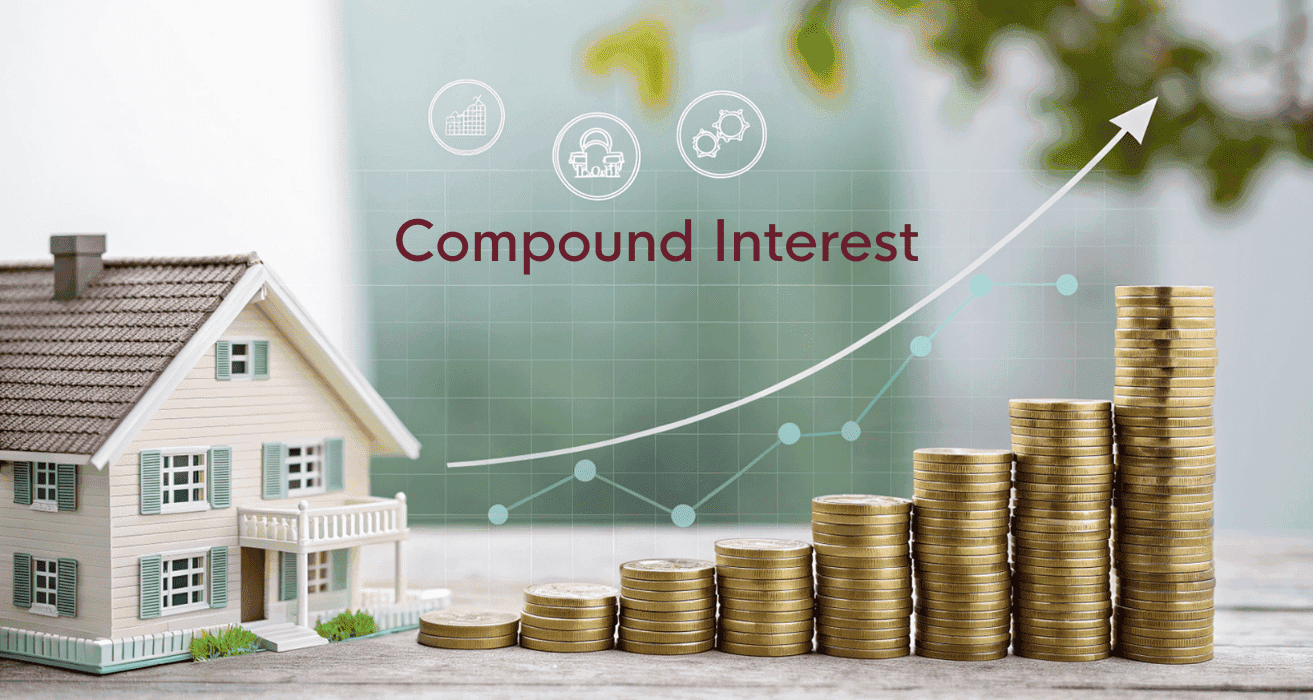How Compound Interest Affects Mortgage Payments Over Time?
July 30, 2025
9 minutes

Ever looked at your mortgage statement and wondered why the balance isn’t shrinking as fast as you thought? You’re not alone. That’s the quiet power of compound interest. For many borrowers, compound interest feels like an invisible force working against them.
Here’s the deal: understanding compound interest can be your secret weapon in navigating mortgage decisions confidently. Whether you’re shopping for a loan, paying down your current one, or refinancing, this guide helps you take back control.
Let’s unpack how it works, how it impacts your payment journey, and what you can do about it.
Key Takeaways:
- Compound interest can significantly increase the total cost of your mortgage over time.
- Understanding how mortgage amortization works helps you plan smarter.
- Paying extra early on or refinancing can reduce the overall interest paid.
- Clear, proactive planning helps avoid surprises and empowers borrowers.
What Is Compound Interest in Mortgages?
In simple terms, compound interest is interest calculated on the principal loan amount and any accumulated interest from previous periods.
Here’s how it works:
- You borrow $300,000.
- Your interest is compounded monthly.
- Each month, your lender calculates interest not just on the original $300,000, but also on any unpaid interest from prior months.
This means:
The earlier you are in your loan term, the more your payment goes toward interest, not principal.
Get Pre-Qualified and Save Up to 1.5% at Closing with reAlpha
Save up to 1.5% at closing when you combine real estate and mortgage services with reAlpha.

Amortization Schedule Breakdown
An amortization schedule is a chart that shows how each mortgage payment is split:
- Early payments: 70–85% interest, 15–30% principal.
- Later payments: 10–20% interest, 80–90% principal.
Why Compound Interest Costs You More Over Time?
When interest is compounded monthly, and you’re only making minimum required payments, you pay more over time.
Here’s a real-world example:
- Loan: $350,000
- Interest rate: 6.5%
- Term: 30 years
- Total repaid: $796,000+ (more than double the original loan)
Most borrowers are shocked to see how much of their money is going toward interest. That’s why it’s crucial to:
- Understand your loan terms.
- Explore bi-weekly or additional payments.
- Consider refinancing when rates drop.
How to Beat the Compound Interest Curve?
Here’s how savvy borrowers reduce their interest burden:
1. Make Extra Payments Early
Every extra dollar goes directly toward your principal early in your loan. That means less balance to compound on.
2. Refinance to a Lower Rate
Lower rate = lower compound growth of interest.
3. Choose a Shorter Loan Term
15-year loans cost more per month but drastically cut interest.
4. Avoid Interest-Only Loans
These delay principal repayment, compounding more long-term interest.
5. Use a Commission-Free Buying Platform
When you avoid paying buyer’s agent commissions, you can redirect that money toward your mortgage.
reAlpha is a homebuying platform that helps buyers save thousands at closing by returning a portion of the buyer agent’s commission when financing through reAlpha Mortgage.
Psychological Traps of Compound Interest
Many borrowers fall into these traps:
- Thinking that “low monthly payment” is a good deal without calculating the total cost.
- Assuming early payments aren’t worth the effort.
- Believing compound interest is fixed and unchangeable.
Remember: You’re in the driver’s seat. Small actions now have huge effects later.
Buying a Home? Get up to 1.5% Cash Back at Closing
Get pre-approval first, then start exploring homes knowing you can receive up to 1.5% of the home price back at closing.

A Smarter Way to Buy a Home - and Save at Closing
Buying a home is a big decision - and having the right information puts you ahead. But the real advantage comes from pairing smart research with a smarter way to buy.
When you use a reAlpha real estate company, you can be eligible to receive up to 1% of the home purchase price back as a credit at closing. Add reAlpha Mortgage, and that rebate can increase to up to 1.5% back, helping offset closing costs and keep more money in your pocket when it matters most.
The rebate is simple, transparent, and applied directly at closing - no complicated hoops, no delayed payouts. Just real savings tied to using a fully integrated homebuying experience.
See how much you could save:
- Check your eligibility
- Explore homes that fit your budget today.
- Your next move could come with thousands back at closing.
Estimate your savings → Rebate Calculator
FAQs
How does compound interest work in a mortgage?
Compound interest in mortgages refers to interest charged on both the loan’s principal and accumulated interest. Most mortgages use monthly compounding.
Can I avoid compound interest?
Not entirely, but you can minimize it with extra payments, refinancing, or shorter loan terms.
Is it better to make bi-weekly payments?
Yes. Bi-weekly payments reduce your principal faster, lowering compound interest.
How much can I save by avoiding a buyer’s agent commission?
Typically 2–3% of the home price, so $6,000–$9,000 on a $300,000 home. Platforms like reAlpha let you keep that equity.
Will refinancing stop compound interest?
It doesn’t stop it, but it can lower your rate and shorten your term, both reduce compound interest costs.
Get the latest market trends, homebuying tips, and insider updates—straight to your inbox. No fluff, just the good stuff.
Article by
Rocky Billore is a mortgage industry leader and Chief Sales Officer with over two decades of experience across residential and commercial lending. Since entering the industry in 2004, he has been directly involved in funding more than $1.4 billion in loans. A recognized expert in VA and government lending, Rocky combines deep program knowledge with a data driven, relationship-first leadership style. His work focuses on building scalable sales organizations, developing high performing teams, and aligning technology with real world lending outcomes to improve the homeownership experience.